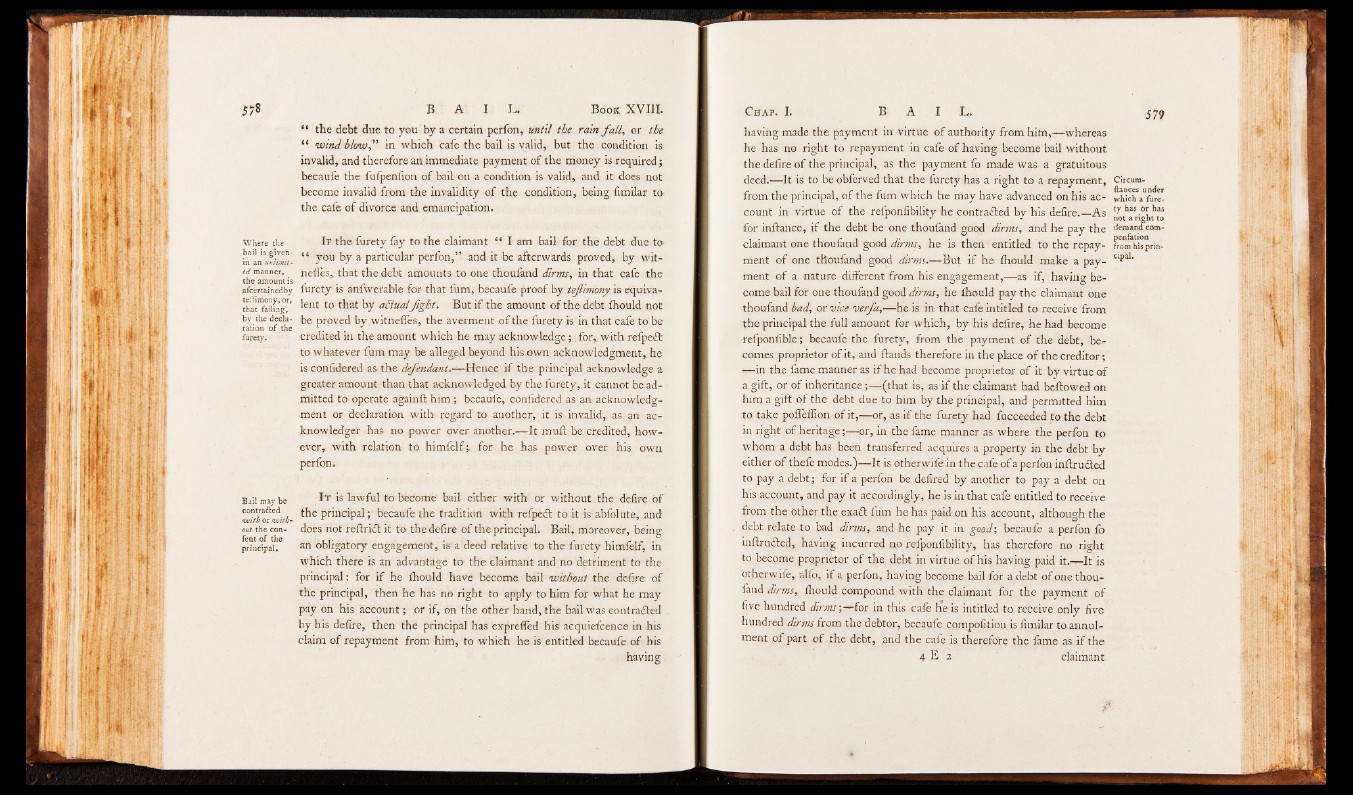
Where the
bail is given,
in an unlimited
manner,
the amount is
afcertainedby
teftimony, or,
that failing,'
by the declaration
of the
furety.
Bail may be
contra&ed
•with or •without
the con-
fent of the
principal.
“ the debt doe to you by a certain perfon, until the rain fa ll, or the
“ wind blow," in which cafe the bail is valid, but the condition is
invalid, and therefore an immediate payment of the money is required;
becaufe the fufpenfion of bail on a condition is valid, and it does not
become invalid from the invalidity of the condition, being, fimilar to
the cafe of divorce and emancipation.
If the furety fay to the claimant “ I am bail for the debt due to'
“ you by a particular perfon,” and it be afterwards proved, by wit-
nelfes,: that the debt amounts to one thoufand dirms, in that cafe the
furety is anfwerable for that fum, becaufe proof by tejlimony is equivalent
to that by actual fight. But if the amount of the debt fhould not
be proved by.witnefles, the averment of the furety is in that cafe to be
credited in the amount which he may acknowledgefor, with refpect
to whatever fum may be alleged beyond his own acknowledgment, he
is eonfidered as thé defendant.-—blcn.cc if the principal acknowledge a
greater amount than that acknowledged by the furety,. it cannot be admitted
to operate again!! him ; becaufe, eonfidered. as an acknowledgment
or declaration with regard to another, it is invalid, as an acknowledger
has no power over another.— It mult be credited, however,
with relation to himfelf;, for he has- , power over his own
perfon.
I t is lawful to Become bail either with- or without the delire of
the principal;, becaufe the tradition with refpedt to it is^abfolute, and
does not reftridt it to the defire of the principal. Bail,, moreover, being
an obligatory engagement, is a deed relative to the furety himfelf, in
which there is an advantage to the claimant and no detriment to the
principal: for if he fhould have become bail without the defire of
the principal, then he has no right to apply to him for what he may
pay on his account; or if, on the other hand, the bail was eontradted.
by his defire, then the principal has expreffed his acquiefcence in his
claim of repayment from him, to which he is entitled becaufe of his
having
having made the payment in virtue of authority from him,— whereas
he has no right to repayment in cafe of having become bail without
the defire of the principal, as the payment fo made was a gratuitous
deed.— It is to be obferved that the furety has a right to a repayment,
from the principal, of the fum which he may have advanced on his account
in virtue of the refponfibility he eontradted by his defire.—As
for inftance, if the debt be one thoufand good dirms, and he pay the
claimant one thoufand good dirms, he is then entitled to the repayment
of one thoufand good dirms.— But if he fhould make a payment
of a nature different from his engagement,— as if, having become
bail for one thoufand good dirms, he fhould pay the claimant one
thoufand bad, or vice verfa,— he is in that cafe intitled to receive from
the principal the full amount for which, by his defire, he had become
refponfible; becaufe the furety, from the payment of the debt, becomes
proprietor of it, and Bands therefore in the place of the creditor;
— in the fame manner as if he had become proprietor of it by virtue of
a gift, or of inheritance;— (that is, as if the claimant had bellowed on
him a gift of the debt due to him by the principal, and permitted him
to take pofleffion of it,— or, as if the furety had fucceeded to the debt
in right of heritage;— or, in the fame manner as where the perfon to
whom a debt has been transferred acquires a property in the debt by
either of thefe modes.)— It is otherwife in the cafe of a perfon inflrudted
to pay a debt; for if a perfon be defired by another to pay a debt on
his account, and pay it accordingly, he is in that cafe entitled to receive
from the other the exadt fum he has paid on his account, although the
debt relate to bad dirms, and he pay it in good-, becaufe a perfon fo
inflrudted, having incurred no relponfibility, has therefore no right
to become proprietor of the debt in virtue of his having paid it.— It is
otherwife, al'fo, if a perfon, haying become bail for a debt of one thoufand
dirms, fhould compound with the claimant for the payment o f
five hundred dirms-,—for in this cafe he is intitled to receive only five
hundred dirms from the debtor, becaufe compofition is firoilar to annulment
o f part of the debt, and the cafe is therefore the fame as if the
4 E 2 ' claimant
Circum-
ftances under
which a fure.-
ty has or has
not a right to
demand com-
penfation
from his principal.